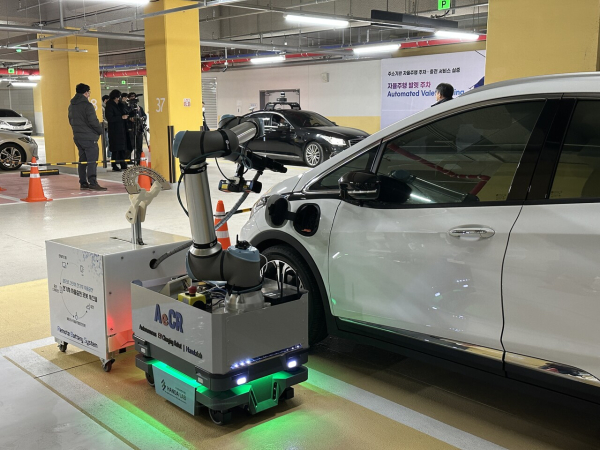[Jungbu Mail] Autonomous Vehicles Can Now Park and Charge in Indoor Pa…
Page Information

Body
HandaLab, an Industrial Robot Manufacturing Company Based in Chungbuk, Participates
[ The Ministry of the Interior and Safety and Sejong Special Autonomous City demonstrated autonomous vehicle valet parking and autonomous robot charging services based on address at the Sejong 2nd Living Zone transfer parking lot on the 14th. ]
[Jungbu Mail, Reporter Park Sang-cheol] In indoor parking lots, where GPS signals cannot be received, autonomous vehicles will soon be able to use object-based addresses for valet parking and autonomous robot charging services.
On the 14th, the Ministry of the Interior and Safety and Sejong Special Autonomous City held a demonstration event at the Sejong 2nd Living Zone transfer parking lot, showcasing address-based autonomous vehicle valet parking and autonomous robot charging services.
The event was attended by officials from the Ministry of the Interior and Safety, Sejong Special Autonomous City, the Sejong City Council, Korea National University of Transportation, Daegu University Industry-Academic Cooperation Foundation, I-Autobahn, HandaLab, and other related companies.
Traditionally, indoor parking lots lacked specific addresses and electronic maps, making autonomous services impossible. However, this demonstration proves that using object-based addresses, autonomous valet parking and electric vehicle charging with autonomous robots can be implemented even in such spaces.
The demonstration also laid the groundwork for spreading autonomous services by providing service models to businesses and utilizing object-based address information assigned to parking lots nationwide.
For this demonstration, the Sejong 2nd Living Zone transfer parking lot, located on the second basement level, was given the object address "Naseongnam-ro 7-7 Parking Lot," and parking spots were numbered (1st floor, 1st spot; 2nd floor, 2nd spot), creating a detailed addressing system.
Additionally, "beacon transmitters" were installed every 30 meters within the parking lot to help autonomous vehicles and robots determine their location using ultrasonic wireless communication.
For autonomous valet parking, the driver exits at a designated pick-up/drop-off point in front of the elevator, and using the "Autonomous Valet Parking App," the vehicle parks itself in an available spot. For pick-up, the driver commands the vehicle to move to the pick-up point via the app, where the vehicle autonomously drives there to allow the driver to get in.
For autonomous robot charging services, after parking, the driver enters the parking spot address (e.g., 1st floor, spot 57) into the "Autonomous Charging App," and the robot moves to the designated spot to charge the vehicle, then notifies the driver via the app.
The Ministry of the Interior and Safety plans to refine this service model and make it available to businesses. It also aims to expand the construction of indoor parking lot data in key buildings.
Kim Seon-jo, Director of Regional Development Policy at the Ministry of the Interior and Safety, said, "By assigning object-based addresses to parking lots, we will continue to support the creation and spread of services incorporating advanced technologies, such as autonomous vehicle parking. Moving forward, we will expand the field of object addresses, creating a virtuous cycle where the public manages shared data and private companies create services."
A representative from HandaLab, which participated in the demonstration, stated, "The current technology product is at the demonstration stage, and we expect commercialization to be possible within a year. Although autonomous electric vehicle charging technology has not yet been commercialized, we believe it is the only solution to address the upcoming infrastructure issues due to the rapid increase in electric vehicles. We plan to accelerate the technology development process with field tests and safety certification to complete the commercialization process."
HandaLab, based in Cheongju Industrial Complex, was founded in November 2021 and specializes in manufacturing industrial robots. It has been selected for the 'BIG Leading Model Support Project' by the Ministry of Science and ICT's affiliated organization, the Science and Technology Job Creation Agency, and has high technical development capabilities in "autonomous robots for electric vehicle charging and infrastructure development."
Additionally, to enhance its commercialization capabilities, HandaLab is receiving support from the Daejeon Science and Technology Cooperative for business development, technology specification provision, and technology commercialization coordination across the entire technology development cycle.
Related Links
-
https://www.jbnews.com/news/articleView.html?idxno=1379035
43Connect a few times

